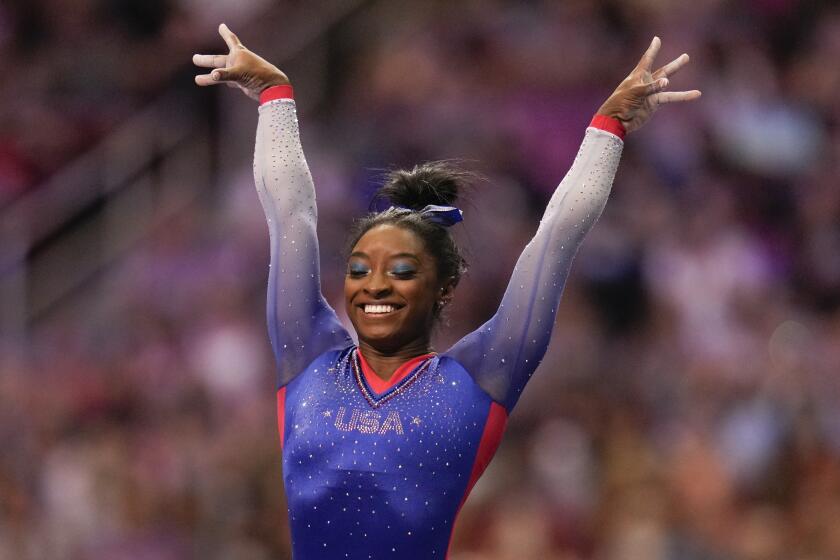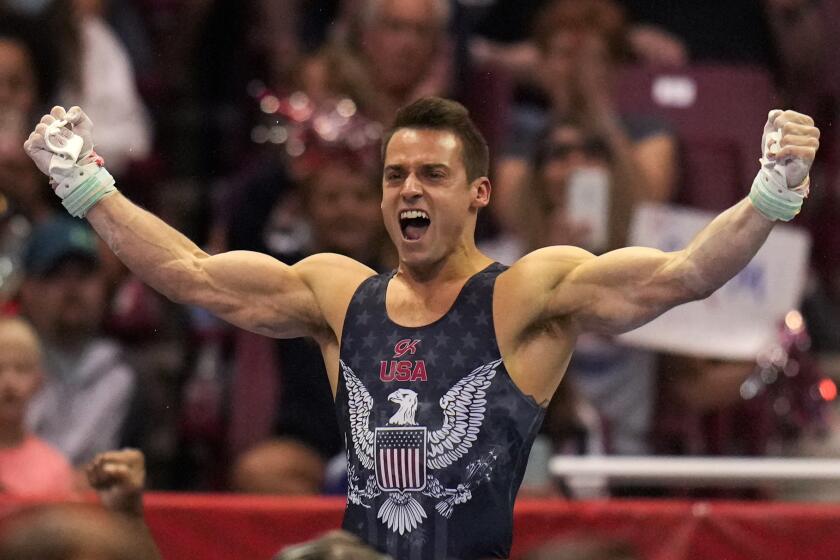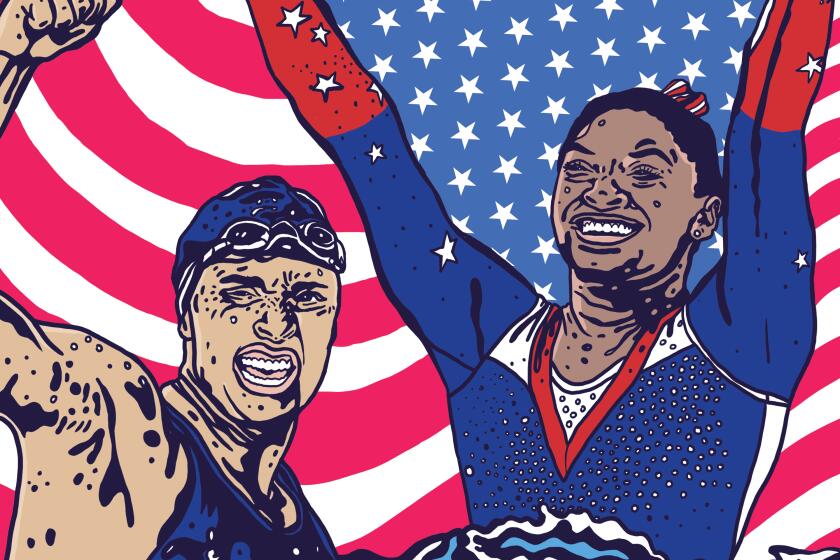Column: U.S. men’s gymnasts have outside shot at medal in Tokyo Games
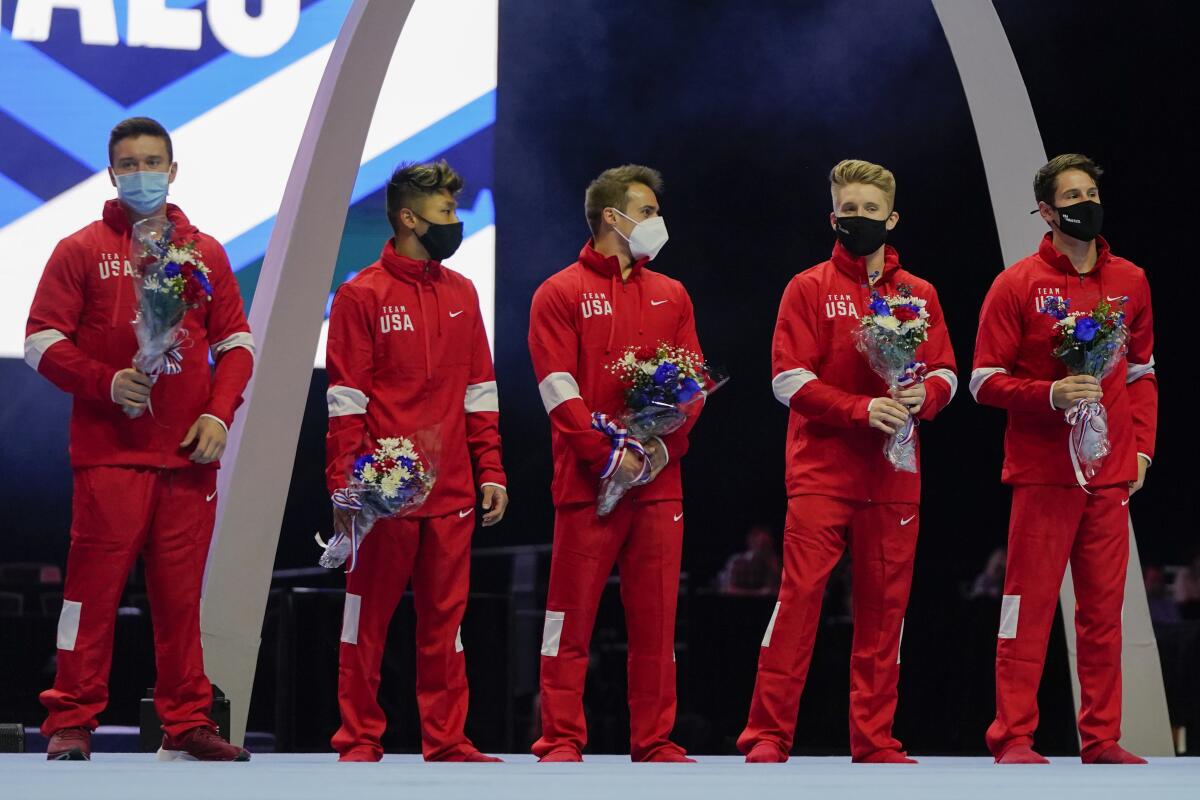
- Share via
TOKYO — Brody Malone has made a name for himself the past few years as one of America’s best male gymnasts. In April, he won his second straight NCAA all-around title, and he followed that in June by winning the all-around titles at the U.S. championships and the Olympic trials with solid, skillful performances. Based on his progress and the high degree of difficulty in his horizontal bar routine, he has a good chance to reach the all-around final at the Tokyo Games and the best chance for an American man to win an individual medal.
Although gymnastics fans know who he is, Malone wasn’t sure the professor of the online class he’s taking this summer was aware of what he does and why he might be absent for a while. So Malone, a rising senior at Stanford who’s majoring in management science and engineering, courteously sent his professor an email a few weeks ago to explain why he had been distracted lately.
“I told him, ‘Hey, I’m in your class this quarter, I’m on the gymnastics team here at Stanford and I’ll be gone, competing in the Olympics. I just wanted to let you know in case there were any kind of assignments or stuff that I may miss,’” Malone said in a telephone interview. “He was super nice in his response. I don’t think he knew it.”
The world will get to know Malone better starting Saturday, when the men’s team qualifications take place at the Ariake Gymnastics Centre. Qualifying will determine the eight teams that advance to the team finals.
NBC Universal will feature more than 7,000 hours of Tokyo Olympics programming on its broadcast, cable and streaming platforms
Scores don’t carry over, but the top 24 performers in qualifying will advance to the all-around final, with a maximum of two gymnasts per national Olympic committee. Nikita Nagornyy of the Russian Olympic Committee, who did a historic triple back pike somersault on floor exercise at the European championships, is favored in the all-around and could also win gold in floor exercise and vault.
The top eight on each apparatus will qualify for the event finals, also with a maximum of two per NOC. That could help Malone: He had the fourth-best horizontal bar score in competition this year, according to thegymter.net website, and the top three scores were earned by Japanese men. The two-per-country rule would limit Japan’s entries and perhaps leave room for Malone to earn a medal.
The U.S. men last won a team medal in 2008, a bronze. They were fifth at Rio in 2016, and fourth at the 2018 and 2019 world championships. Defending Olympic champion Japan is expected to contend for gold against Chineseand Russian athletes competing as the Russian Olympic Committee.
“It’s been challenging,” Brett McClure, high performance director for men’s gymnastics for USA Gymnastics, said during the Olympic trials. “Every Olympics has been a different scenario, whether it be the difficulty level is right there but the consistency wasn’t [or vice versa]. We’re going to have to align all the stars to match up the difficulty and execution with the rest of the world. I’m tired and I know these guys are tired of playing catchup.”
Malone, 21, remains optimistic the U.S. men’s team — which also includes three-time Olympian Sam Mikulak of Newport Coast, dynamic trials runner-up Yul Moldauer and former University of Minnesota standout Shane Wiskus — can win a medal. Alec Yoder also will compete as an event specialist.
Sam Mikulak of Newport Beach and Shane Wiskus overcame obstacles to make the U.S. men’s gymnastics team, which will try to revive its fortunes in Tokyo.
“I definitely think we’ve got a shot at it,” Malone said. “Anything can happen on any given day, especially in gymnastics. So definitely don’t count us out of it. We’ve just got to go out there and do our gymnastics and let the scores fall where they do.”
But he knows that even their best might not be good enough for a top-three team finish. “The other teams definitely have higher difficulty than us, for sure,” Malone said, “but again, anything can happen.”
Malone’s life has taken some major positive turns this year beyond his gymnastics triumphs. With the NCAA now allowing college athletes to benefit financially from their name, image and likeness, he negotiated a deal with Endless Rope, a fitness training device he used while Stanford’s campus was closed and he trained in Cypress, Texas. He liked it so much he agreed to invest in the company.
The deal will have a greater purpose than padding his bank account. He intends to direct proceeds to a foundation that honors his mother, Tracy, who died of breast cancer in 2012 at 37. “This is definitely going to give me the opportunity to do that,” said Brody, who ties a pink bandana to his backpack to remind himself of her bravery during her chemotherapy treatments.
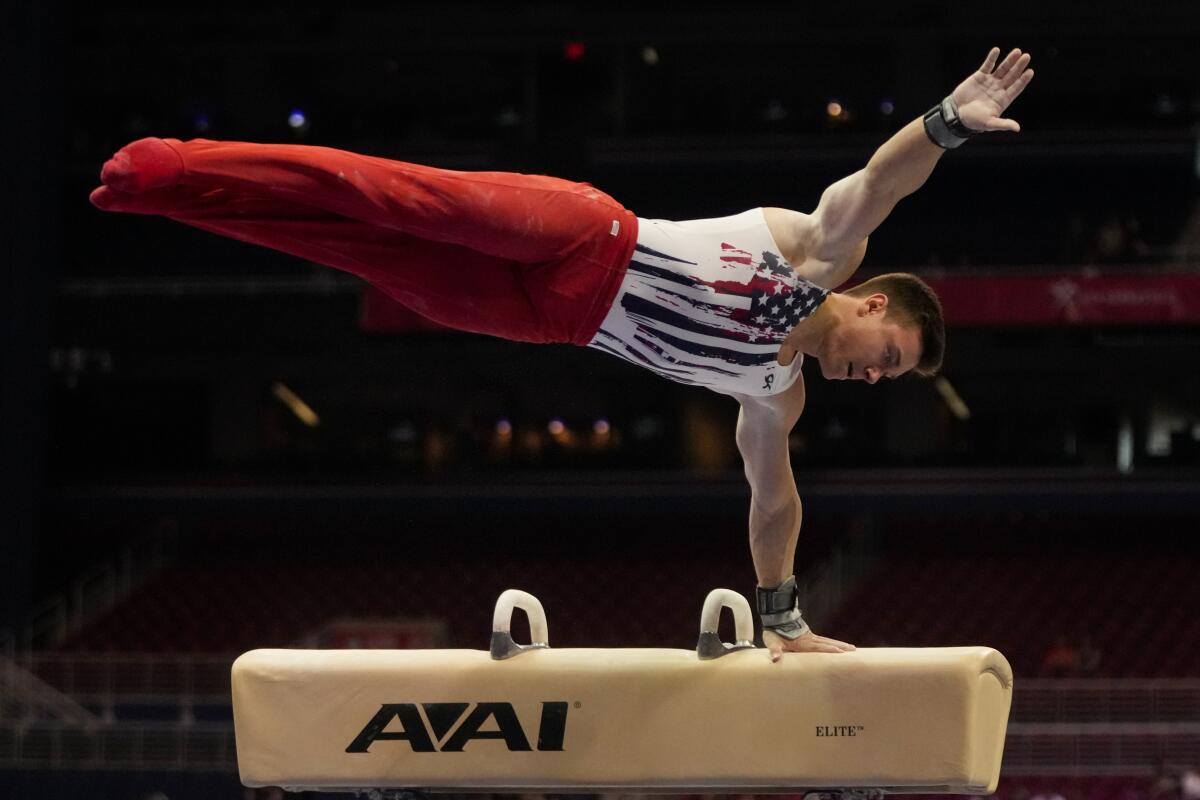
The foundation’s goal is to repay the kindness shown to the Malone family by the people of Polk County, Ga., during her illness. “Over the past years we have been able to help families in need by providing them with groceries, gas, help with medical bills and a few other needs that have come to our attention,” his father, JD Malone, said via email.
Brody has left his father to operate the foundation and negotiate other potential endorsements so he can concentrate on helping the U.S. men break through for a medal here. They might benefit from some of the changes that have occurred at the top internationally.
Elegant Kohei Uchimura of Japan, nicknamed “King” for dominating the past two Olympic cycles and winning gold in the all-around at London in 2012 and at Rio, won’t go for a three-peat. Worn down by injuries at 32, he barely made the Japanese team and will focus on the horizontal bar. “It was really hard for me, for such an old fogey, to perform after the new generation,” he said after he secured his Olympic berth.
Oleg Verniaiev of Ukraine, the runner-up in the Rio all-around competition and the parallel bars gold medalist, will miss these Games while serving a four-year ban for testing positive for the drug meldonium. Five-time Olympic medalist Max Whitlock of Great Britain, who won bronze in the all-around in Rio and gold in floor exercise and the pommel horse, has narrowed his competitive focus to the pommel horse. In addition, Rio horizontal bars champion Fabien Hambuechen of Germany and Rio vault champion Ri Se-gwang of North Korea have retired.
So there’s a chance for the U.S. men’s team and Malone individually to bring home medals. A slim chance, maybe, but better than none at all. “I definitely feel ready,” Malone said. “I’ve done as much preparation as I can and I feel like the preparation has been going really well. ... I think making the team was the hardest part and being able to compete in Tokyo is just going to be icing on the cake.”
Here’s everything you need to know about the Tokyo Olympics, including Katie Ledecky and Simone Biles’ dominance and Southern California’s influence on the Games.
More to Read
Go beyond the scoreboard
Get the latest on L.A.'s teams in the daily Sports Report newsletter.
You may occasionally receive promotional content from the Los Angeles Times.

